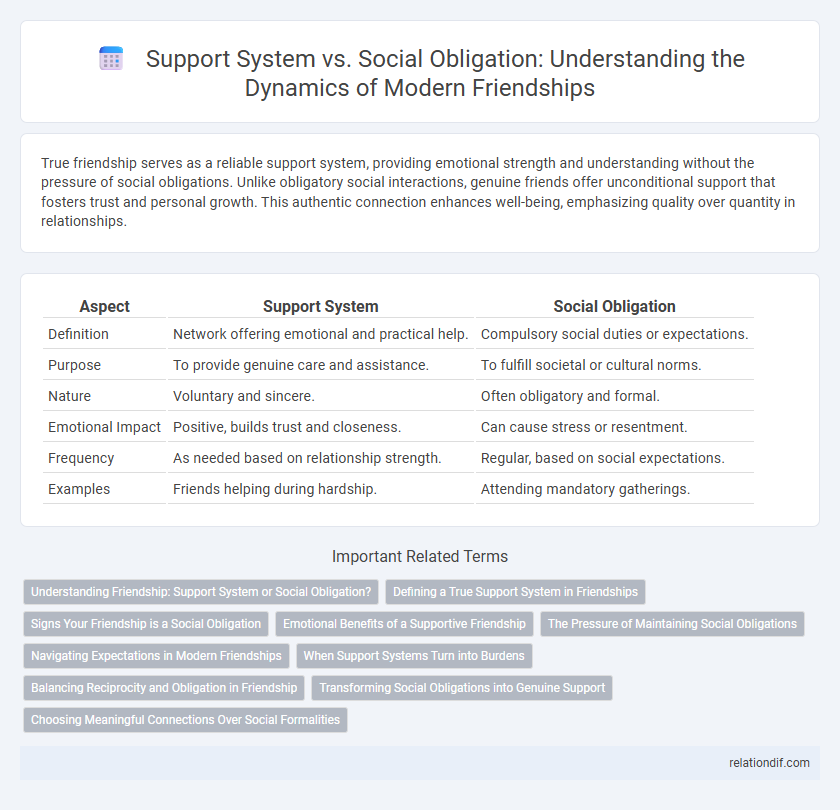True friendship serves as a reliable support system, providing emotional strength and understanding without the pressure of social obligations. Unlike obligatory social interactions, genuine friends offer unconditional support that fosters trust and personal growth. This authentic connection enhances well-being, emphasizing quality over quantity in relationships.
Table of Comparison
| Aspect | Support System | Social Obligation |
|---|---|---|
| Definition | Network offering emotional and practical help. | Compulsory social duties or expectations. |
| Purpose | To provide genuine care and assistance. | To fulfill societal or cultural norms. |
| Nature | Voluntary and sincere. | Often obligatory and formal. |
| Emotional Impact | Positive, builds trust and closeness. | Can cause stress or resentment. |
| Frequency | As needed based on relationship strength. | Regular, based on social expectations. |
| Examples | Friends helping during hardship. | Attending mandatory gatherings. |
Understanding Friendship: Support System or Social Obligation?
A true friendship functions primarily as a support system, providing emotional encouragement, trust, and mutual care beyond mere social obligations. Unlike social obligations, which often involve routine interactions or formal expectations, support systems in friendships foster genuine understanding and reciprocal assistance during times of need. Recognizing this distinction helps individuals prioritize meaningful connections based on empathy rather than obligation.
Defining a True Support System in Friendships
A true support system in friendships is defined by mutual trust, empathy, and consistent availability during difficult times, rather than mere social obligation or routine interactions. Genuine friends actively listen, offer constructive help, and prioritize emotional well-being over superficial commitments. This authentic connection fosters resilience and personal growth, distinguishing it from obligatory social relationships.
Signs Your Friendship is a Social Obligation
Feeling drained or anxious before interacting with a friend can signal that the relationship feels more like a social obligation than a genuine support system. If conversations are one-sided, lacking empathy or understanding, and interactions revolve around maintaining appearances rather than authentic connection, the friendship may be based on duty rather than mutual care. Recognizing these signs helps identify relationships that lack the emotional support essential for true friendship.
Emotional Benefits of a Supportive Friendship
A supportive friendship fosters emotional resilience by providing a safe space for vulnerability, which differs significantly from the superficial interactions often driven by social obligation. Genuine support systems enhance mental health through consistent empathy, active listening, and validation of feelings, resulting in reduced stress and increased feelings of belongingness. This deeper emotional connection strengthens trust and promotes long-term psychological well-being, unlike obligatory social ties that may lack authentic emotional exchange.
The Pressure of Maintaining Social Obligations
The pressure of maintaining social obligations often leads to stress and exhaustion, blurring the line between genuine support systems and performative interactions. True friendship thrives on mutual understanding and emotional presence, while social obligations can create a sense of duty that diminishes authentic connection. Recognizing the difference helps preserve mental well-being and fosters more meaningful, supportive relationships.
Navigating Expectations in Modern Friendships
Navigating expectations in modern friendships requires distinguishing between genuine support systems and social obligations, as authentic connections provide emotional resilience while social obligations often lead to superficial interactions. Prioritizing friends who offer consistent empathy and understanding fosters deeper bonds and mutual growth. Recognizing these differences helps individuals maintain meaningful relationships without overwhelming social pressure.
When Support Systems Turn into Burdens
A healthy support system in friendship offers emotional stability and mutual concern without imposing obligations that feel burdensome. When friends begin to perceive support as an obligatory task rather than genuine care, stress and resentment can replace trust and comfort. Recognizing the balance between providing help and respecting boundaries prevents support systems from becoming overwhelming social obligations.
Balancing Reciprocity and Obligation in Friendship
Balancing reciprocity and obligation in friendship requires recognizing the difference between genuine support systems and social obligations. True friendships thrive on mutual care and voluntary support that prioritize emotional well-being over transactional exchanges. Navigating this balance prevents friendships from becoming burdensome while fostering deeper, more resilient connections.
Transforming Social Obligations into Genuine Support
Transforming social obligations into genuine support involves shifting from superficial interactions to meaningful connections that prioritize emotional availability and trust. Emphasizing active listening and consistent encouragement fosters a reliable support system, strengthening friendships beyond mere social expectations. Genuine support enhances resilience and well-being by creating a foundation of mutual care and authentic engagement.
Choosing Meaningful Connections Over Social Formalities
A strong support system thrives on meaningful connections that foster trust, empathy, and genuine understanding, rather than superficial social obligations driven by etiquette or appearances. Prioritizing friendships that provide emotional support and mutual growth enhances well-being and builds resilience against life's challenges. Choosing quality over quantity in relationships leads to deeper bonds and a more fulfilling social life.
Support System vs Social Obligation Infographic

 relationdif.com
relationdif.com